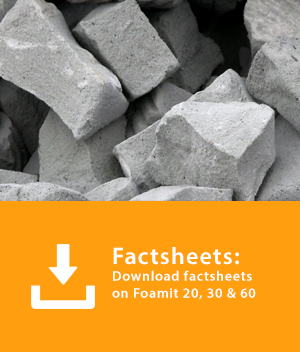Womersleys supply foamed glass that is an environmentally friendly insulating product and low capillarity lightweight fill, which is manufactured from cleaned recycled glass. It is ideal as an insulating lightweight aggregate material for infrastructure projects as well as providing insulation in a wide range of buildings, foundations, limecrete floors and roofs (green roofs, rooftop parking, rooftop terraces etc).
Foamed glass is a lightweight aggregate made from purified recycled glass. Foam glass has been used in Europe and Scandinavia for a long time and its positive benefits are widely known; it is environmentally friendly, non-flammable, lightweight and easy to work with.
Foam glass as a bulk filler material is one of the lightest on the market. Benefits of this low density include the ease of compaction of the material and transport efficiency.
Foam glass’s cell structure gives the product uniquely low thermal conductivity (dry about 0.1 W / mK), making it an excellent insulator.
Foam glass easy compaction and angle of friction ensure a stable substructure on site.
Foam glass is non-combustible and has low capillarity, meaning it can be effective as a moisture barrier.
Foam glass is made up of 99% purified recycled glass. Thanks to the nature of the manufacturing process of foam glass, there is no organic matter contained in the finished products.
Foam glass’s raw material is recycled glass, which is cleaned and milled before being heated in the furnace. Due to the manufacturing technique, it does not contain organic substances and is non-flammable. It is odourless, inert and does not leach harmful substances in conventional applications. Using recycled glass as a raw material saves virgin natural resources and reduces the carbon footprint. Foamit is reusable and can be upcycled. The use of Foamit for fill material and / or frost insulation of road, street and field structures will not cause significant groundwater pollution.
FOAM GLASS PRODUCTION: WET OR DRY PROCESS?
Why Foamed Glass UK Ltd uses the dry process.
Foamglass produced using the dry process tends to be denser and stronger due to a few key
factors:
● Finer Particle Size: The dry process generally utilizes finer glass powder compared to the
wet process. This finer powder allows for more nucleation sites for bubble formation, resulting
in a more uniform and smaller pore structure. Smaller pores lead to higher density and
increased strength.
● Better Control of Foaming: The dry process allows for more precise control of the foaming
process. Factors like the amount of foaming agent and the heating rate can be carefully
managed, leading to a more consistent and homogenous foam structure. This consistency
contributes to higher density and strength.
● Reduced Moisture Content: The dry process eliminates the need for water or other liquids
in the mixing stage. This absence of moisture helps prevent the formation of large, irregular
pores that can weaken the foam glass.
In summary
The dry process results in a finer, more uniform, and controlled foam structure
with reduced moisture content. These factors contribute to the higher density and strength of
foam glass produced using this method.
Additional points to consider:
● The specific type of foaming agent used can also influence the density and strength of the
foam glass.
● The overall manufacturing process and quality control measures play a significant role in the
final product properties.
● While the dry process generally produces denser and stronger foam glass, it may also be
more expensive and energy-intensive compared to the wet process.
Technical Data
|
Unit |
Foamglass 40 |
|
|---|---|---|
| Agreegate | mm | 20-40mm |
| Loose Weight (Dry) | kg/m3 | 230-280 |
| Capillary Water Suction Height | mm | 160-180mm |
| Thermal Conductivity | W/mk | 0.1 |
| Bulk Crusching Resistance | N/mm2 | > 0.9 |
| Resistance to Disintergration | % | 0.97 |
| Design Density | kN/m3 | 3.0 |
| Bulk Density with Compaction | Kg/M3 | 300-370 |
| Purity | % | <1% Organic substances |
| Compression Strength (repose) |
N/mm2 | >0.9 |
| Resistance to Fire | Incombustable | A1 |
| Carbon Footprint | eq/m3 | 45-55 |
| Technical Standard | BSEN |
BSEN 13055 BSEN 13242 |
For more information please get in touch.



